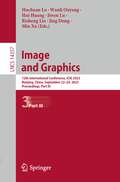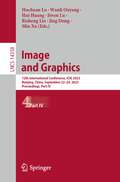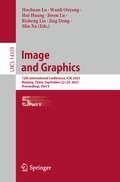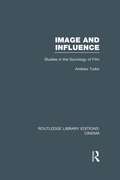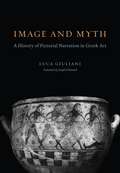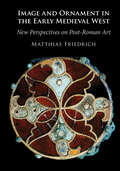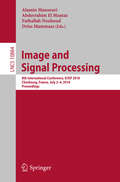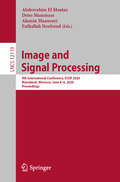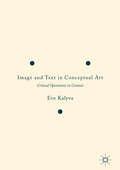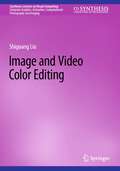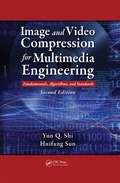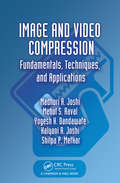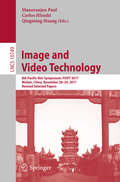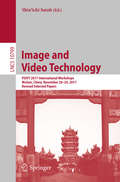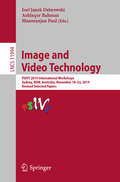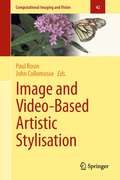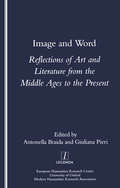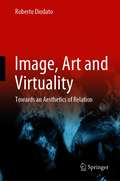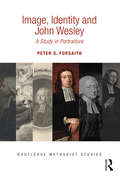- Table View
- List View
Image and Graphics: 12th International Conference, ICIG 2023, Nanjing, China, September 22–24, 2023, Proceedings, Part III (Lecture Notes in Computer Science #14357)
by Min Xu Hui Huang Jiwen Lu Huchuan Lu Jing Dong Wanli Ouyang Risheng LiuThe five-volume set LNCS 14355, 14356, 14357, 14358 and 14359 constitutes the refereed proceedings of the 12th International Conference on Image and Graphics, ICIG 2023, held in Nanjing, China, during September 22–24, 2023.The 166 papers presented in the proceedings set were carefully reviewed and selected from 409 submissions. They were organized in topical sections as follows: computer vision and pattern recognition; computer graphics and visualization; compression, transmission, retrieval; artificial intelligence; biological and medical image processing; color and multispectral processing; computational imaging; multi-view and stereoscopic processing; multimedia security; surveillance and remote sensing, and virtual reality.The ICIG 2023 is a biennial conference that focuses on innovative technologies of image, video and graphics processing and fostering innovation, entrepreneurship, and networking. It will feature world-class plenary speakers, exhibits, and high-quality peer reviewed oral and poster presentations.
Image and Graphics: 12th International Conference, ICIG 2023, Nanjing, China, September 22–24, 2023, Proceedings, Part IV (Lecture Notes in Computer Science #14358)
by Min Xu Hui Huang Jiwen Lu Huchuan Lu Jing Dong Wanli Ouyang Risheng LiuThe five-volume set LNCS 14355, 14356, 14357, 14358 and 14359 constitutes the refereed proceedings of the 12th International Conference on Image and Graphics, ICIG 2023, held in Nanjing, China, during September 22–24, 2023.The 166 papers presented in the proceedings set were carefully reviewed and selected from 409 submissions. They were organized in topical sections as follows: computer vision and pattern recognition; computer graphics and visualization; compression, transmission, retrieval; artificial intelligence; biological and medical image processing; color and multispectral processing; computational imaging; multi-view and stereoscopic processing; multimedia security; surveillance and remote sensing, and virtual reality.The ICIG 2023 is a biennial conference that focuses on innovative technologies of image, video and graphics processing and fostering innovation, entrepreneurship, and networking. It will feature world-class plenary speakers, exhibits, and high-quality peer reviewed oral and poster presentations.
Image and Graphics: 12th International Conference, ICIG 2023, Nanjing, China, September 22–24, 2023, Proceedings, Part V (Lecture Notes in Computer Science #14359)
by Min Xu Hui Huang Jiwen Lu Huchuan Lu Jing Dong Wanli Ouyang Risheng LiuThe five-volume set LNCS 14355, 14356, 14357, 14358 and 14359 constitutes the refereed proceedings of the 12th International Conference on Image and Graphics, ICIG 2023, held in Nanjing, China, during September 22–24, 2023.The 166 papers presented in the proceedings set were carefully reviewed and selected from 409 submissions. They were organized in topical sections as follows: computer vision and pattern recognition; computer graphics and visualization; compression, transmission, retrieval; artificial intelligence; biological and medical image processing; color and multispectral processing; computational imaging; multi-view and stereoscopic processing; multimedia security; surveillance and remote sensing, and virtual reality.The ICIG 2023 is a biennial conference that focuses on innovative technologies of image, video and graphics processing and fostering innovation, entrepreneurship, and networking. It will feature world-class plenary speakers, exhibits, and high-quality peer reviewed oral and poster presentations.
Image and Imagination
by C. S. LewisImage and Imagination presents some of C.S. Lewis's finest literary criticism and religious exposition. This selection gathers together forty book reviews--never before reprinted--as well as four major essays which have been unavailable for many decades, and a fifth essay, "Image and Imagination," published for the first time. The essays and reviews substantiate Lewis's reputation as an eloquent and authoritative critic across a wide range of literature, and as a keen judge of contemporary scholarship, while his reviews of The Hobbit and The Lord of the Rings will be of additional interest to scholars and students of fantasy.
Image and Imagination
by C. S. LewisImage and Imagination presents some of C.S. Lewis's finest literary criticism and religious exposition. This selection gathers together forty book reviews--never before reprinted--as well as four major essays which have been unavailable for many decades, and a fifth essay, "Image and Imagination," published for the first time. The essays and reviews substantiate Lewis's reputation as an eloquent and authoritative critic across a wide range of literature, and as a keen judge of contemporary scholarship, while his reviews of The Hobbit and The Lord of the Rings will be of additional interest to scholars and students of fantasy.
Image and Imagination
by C. S. LewisImage and Imagination presents some of C.S. Lewis's finest literary criticism and religious exposition. This selection gathers together forty book reviews--never before reprinted--as well as four major essays which have been unavailable for many decades, and a fifth essay, "Image and Imagination," published for the first time. The essays and reviews substantiate Lewis's reputation as an eloquent and authoritative critic across a wide range of literature, and as a keen judge of contemporary scholarship, while his reviews of The Hobbit and The Lord of the Rings will be of additional interest to scholars and students of fantasy.
Image and Influence: Studies in the Sociology of Film (Routledge Library Editions: Cinema)
by Andrew TudorThis text outlines what sociologists need to know of the nature of communication and of mass culture, while also looking in some empirical detail at the workings of the Hollywood community and the psychology of the star system. It explores trends such as attempts to adapt semiology and psycholinguistics to our understanding of film ‘language’, using them to develop a paradigm for film analysis. The book goes on to offer a guide to comprehension of the relation between cinema and society through detailed analysis of the relation between the German silent cinema and its social context and extensive discussion of popular genres like the western, gangster movie and horror movie. Seeing movies in terms of meaning, as reservoirs of culture which audiences may use for a variety purposes, this book uses a combination of sociological perspective and critical method to present a unique intriguing perspective.
Image and Myth: A History of Pictorial Narration in Greek Art
by Luca Giuliani translated by Joseph O'DonnellOn museum visits, we pass by beautiful, well-preserved vases from ancient Greece but how often do we understand what the images on them depict? In "Image and Myth," Luca Giuliani tells the stories behind the pictures, exploring how artists of antiquity had to determine which motifs or historical and mythic events to use to tell an underlying story while also keeping in mind the tastes and expectations of paying clients. Covering the range of Greek style and its growth between the early Archaic and Hellenistic periods, Giuliani describes the intellectual, social, and artistic contexts in which the images were created. He reveals that developments in Greek vase painting were driven as much by the times as they were by tradition the better-known the story, the less leeway the artists had in interpreting it. As literary culture transformed from an oral tradition, in which stories were always in flux, to the stability of written texts, the images produced by artists eventually became nothing more than illustrations of canonical works. At once a work of cultural and art history, "Image and Myth" builds a new way of understanding the visual culture of ancient Greece. "
Image and Myth: A History of Pictorial Narration in Greek Art
by Luca GiulianiOn museum visits, we pass by beautiful, well-preserved vases from ancient Greece—but how often do we understand what the images on them depict? In Image and Myth, Luca Giuliani tells the stories behind the pictures, exploring how artists of antiquity had to determine which motifs or historical and mythic events to use to tell an underlying story while also keeping in mind the tastes and expectations of paying clients. Covering the range of Greek style and its growth between the early Archaic and Hellenistic periods, Giuliani describes the intellectual, social, and artistic contexts in which the images were created. He reveals that developments in Greek vase painting were driven as much by the times as they were by tradition—the better-known the story, the less leeway the artists had in interpreting it. As literary culture transformed from an oral tradition, in which stories were always in flux, to the stability of written texts, the images produced by artists eventually became nothing more than illustrations of canonical works. At once a work of cultural and art history, Image and Myth builds a new way of understanding the visual culture of ancient Greece.
Image and Ornament in the Early Medieval West: New Perspectives on Post-Roman Art
by Matthias FriedrichScholarship often treats the post-Roman art produced in central and north-western Europe as representative of the pagan identities of the new 'Germanic' rulers of the early medieval world. In this book, Matthias Friedrich offers a critical reevaluation of the ethnic and religious categories of art that still inform our understanding of early medieval art and archaeology. He scrutinises early medieval visual culture by combining archaeological approaches with art historical methods based on contemporary theory. Friedrich examines the transformation of Roman imperial images, together with the contemporary, highly ornamented material culture that is epitomized by 'animal art.' Through a rigorous analysis of a range of objects, he demonstrates how these pathways produced an aesthetic that promoted variety (varietas), a cross-cultural concept that bridged the various ethnic and religious identities of post-Roman Europe and the Mediterranean worlds.
Image and Signal Processing: 8th International Conference, ICISP 2018, Cherbourg, France, July 2-4, 2018, Proceedings (Lecture Notes in Computer Science #10884)
by Alamin Mansouri Fathallah Nouboud Driss Mammass Abderrahim El MoatazThis book constitutes the refereed proceedings of the 8th International Conference on Image and Signal Processing, ICISP 2018, held in Cherbourg, France, in July 2018. The 58 revised full papers were carefully reviewed and selected from 122 submissions. The contributions report on the latest developments in image and signal processing, video processing, computer vision, multimedia and computer graphics, and mathematical imaging and vision.
Image and Signal Processing: 9th International Conference, ICISP 2020, Marrakesh, Morocco, June 4–6, 2020, Proceedings (Lecture Notes in Computer Science #12119)
by Alamin Mansouri Fathallah Nouboud Driss Mammass Abderrahim El MoatazThis volume constitutes the refereed proceedings of the 9th International Conference on Image and Signal Processing, ICISP 2020, which was due to be held in Marrakesh, Morocco, in June 2020. The conference was cancelled due to the COVID-19 pandemic.The 40 revised full papers were carefully reviewed and selected from 84 submissions. The contributions presented in this volume were organized in the following topical sections: digital cultural heritage & color and spectral imaging; data and image processing for precision agriculture; machine learning application and innovation; biomedical imaging; deep learning and applications; pattern recognition; segmentation and retrieval; mathematical imaging & signal processing.
Image and Text in Conceptual Art
by Eve KalyvaThis book examines the use of image/text juxtapositions in conceptual art as a critical strategy to challenge the ideological and institutional demands placed on art. While conceptual art is generally identified by its use of language, its analysis should make clear how exactly language was used. In particular, this book asks: how has the presence of language in a visual art context changed the ways art is talked about, theorized and produced? Image and Text in Conceptual Art demonstrates how artworks communicate in context and evaluates their critical potential. It considers international case studies and draws interdisciplinary resources from art history and theory, philosophy, discourse analysis, social semiotics, and literary criticism. It presents three analytic frameworks that engage art's critical and social dimensions: the work's performative gesture, its logico-semantic relations, and the rhetorical operations in the discursive creation of meaning, and offers a comprehensive method of analysis that can be applied beyond conceptual art.
Image and Video Color Editing (Synthesis Lectures on Visual Computing: Computer Graphics, Animation, Computational Photography and Imaging)
by Shiguang LiuThis book covers image and video color editing research advances over the last two decades. Bringing readers up to speed on digital image and video editing techniques and research, the book delves into an area that has attracted much attention from researchers due to the rapid development of computer graphics and the widespread prevalence of digital cameras and mobile phones in daily life. Readers will get a comprehensive overview of the theory and application of color transfer, emotional color transfer, colorization, decolorization, and style transfer in altering still and moving digital images. Despite the existence of professional image editing software that can complete complex image editing work, the skills required to achieve satisfactory editing results can be prohibitive, and even professional image editors need to spend a lot of time developing and maintaining aptitude in a niche tool. Instead, the book explores image and video editing techniques that are simple and effective alternatives to such editing software that professional and amateur image editors can utilize. The book focuses on color as one of the most important features of an image or video. Image and video color editing aims to dramatically alter source images suitable for a wide range of applications.
Image and Video Compression for Multimedia Engineering: Fundamentals, Algorithms, and Standards (Second Edition) (Image Processing Series)
by Yun Q. Shi Huifang Sun<p>Multimedia hardware still cannot accommodate the demand for large amounts of visual data. Without the generation of high-quality video bitstreams, limited hardware capabilities will continue to stifle the advancement of multimedia technologies. Thorough grounding in coding is needed so that applications such as MPEG-4 and JPEG 2000 may come to fruition. <p>Image and Video Compression for Multimedia Engineering provides a solid, comprehensive understanding of the fundamentals and algorithms that lead to the creation of new methods for generating high quality video bit streams. The authors present a number of relevant advances along with international standards. <p>Visual data, image, and video coding will continue to enable the creation of advanced hardware, suitable to the demands of new applications. Covering both image and video compression, this book yields a unique, self-contained reference for practitioners tobuild a basis for future study, research, and development.</p>
Image and Video Compression: Fundamentals, Techniques, and Applications
by Madhuri A. Joshi Mehul S. Raval Yogesh H. Dandawate Kalyani R. Joshi Shilpa P. MetkarImage and video signals require large transmission bandwidth and storage, leading to high costs. The data must be compressed without a loss or with a small loss of quality. Thus, efficient image and video compression algorithms play a significant role in the storage and transmission of data.Image and Video Compression: Fundamentals, Techniques, and
Image and Video Technology
by Manoranjan Paul Carlos Hitoshi Qingming HuangThis book constitutes the thoroughly refereed post-conference proceedings of the 8th Pacific Rim Symposium on Image and Video Technology, PSIVT 2017, held in Wuhan, China, in November 2017.The total of 39 revised papers was carefully reviewed and selected from 91 submissions.The Pacific-Rim Symposium on Image and Video Technology (PSIVT) is a high-quality series of symposia that aim at providing a forum for researchers and practitioners who are being involved, or are contributing to theoretical advances or practical implementations in image and video technology.
Image and Video Technology: PSIVT 2017 International Workshops, Wuhan, China, November 20-24, 2017, Revised Selected Papers (Lecture Notes in Computer Science #10799)
by Shin'Ichi SatohThis book constitutes the thoroughly refereed post-conference proceedings of five international workshops held in the framework of the 8th Pacific-Rim Symposium on Image and Video Technology, PSIVT 2017, in Wuhan, China, in November 2017: Workshop on Human Behavior Analysis; Workshop on Educational Cloud and Image/Video Enriched Cloud Services, ECIVECS; Workshop: Vision Meets Graphics, VG; Workshop on Active Electro-Optical Sensors for Aerial and Space Imaging, EO4AS; and Workshop on Computer Vision and Modern Vehicles, CVMV.The 34 revised full papers and 2 posters presented were carefully selected from 103 submissions. The papers cover the full range of state-of-the-art research in image and video technology with topics ranging from well-established areas to novel current trends.
Image and Video Technology: PSIVT 2019 International Workshops, Sydney, NSW, Australia, November 18–22, 2019, Revised Selected Papers (Lecture Notes in Computer Science #11994)
by Manoranjan Paul Joel Janek Dabrowski Ashfaqur RahmanThis book constitutes the thoroughly refereed post-conference proceedings of four international workshops held in the framework of the 9th Pacific-Rim Symposium on Image and Video Technology, PSIVT 2019, in Sydney, NSW, Australia, in November 2019: Vision-Tech: Workshop on Challenges, Technology, and Solutions in the Areas of Computer Vision; Workshop on Passive and Active Electro‐Optical Sensors for Aerial and Space Imaging; Workshop on Deep Learning and Image Processing Techniques for Medical Images; and Workshop on Deep Learning for Video and Image Analysis.The 16 revised full papers presented were carefully selected from 26 submissions. The papers cover the full range of state-of-the-art research in image and video technology with topics ranging from well-established areas to novel current trends.
Image and Video-Based Artistic Stylisation
by Paul Rosin John CollomosseNon-photorealistic rendering (NPR) is a combination of computer graphics and computer vision that produces renderings in various artistic, expressive or stylized ways such as painting and drawing. This book focuses on image and video based NPR, where the input is a 2D photograph or a video rather than a 3D model. 2D NPR techniques have application in areas as diverse as consumer and professional digital photography and visual effects for TV and film production. The book covers the full range of the state of the art of NPR with every chapter authored by internationally renowned experts in the field, covering both classical and contemporary techniques. It will enable both graduate students in computer graphics, computer vision or image processing and professional developers alike to quickly become familiar with contemporary techniques, enabling them to apply 2D NPR algorithms in their own projects.
Image and Word: Reflections of Art and Literature
by Antonella Braida"What was the role of images in the Western tradition? And how did they relate to the printed work? The essays in this wide-ranging collection address these questions by presenting a variety of material, including visual representations that can be read as texts and traditional book illustrations. The editors offer a critical review of visual arts and texts, encompassing thirteenth-century Spanish miniatures, Italian Renaissance painting and book illustrations, the explosion of inter-arts comparisons in the nineteenth century in the works of such diverse writers as Blake, Mallarme and D'Annunzio, and the modern debate on the visual arts."
Image and the Office of the Dead in Late Medieval Europe: Regular, Repellant, and Redemptive Death (Visual and Material Culture, 1300-1700)
by Sarah SchellImage and the Office of the Dead in Late Medieval Europe explores the Office of the Dead as a site of interaction between text, image, and experience in the culture of commemoration that thrived in the fourteenth and fifteenth centuries. The Office of the Dead was a familiar liturgical ritual, and its perceived importance and utility are evident in its regular inclusion in devotional compilations, which crossed the boundaries between lay and religious readers. The Office was present in all medieval deaths: as a focus for private contemplation, a site of public performance, a reassuring ritual, and a voice for the bereaved. Examining the images at the Office of the Dead and related written, visual, and material evidence, this book explores the relationship of these images to the text in which they are embedded and to the broader experiences of and aspirations for death.
Image, Action, and Idea in Contemporary Jewish Art (Dimyonot: Jews and the Cultural Imagination #5)
by Ben SchachterContemporary Jewish art is a growing field that includes traditional as well as new creative practices, yet criticism of it is almost exclusively reliant on the Second Commandment’s prohibition of graven images. Arguing that this disregards the corpus of Jewish thought and a century of criticism and interpretation, Ben Schachter advocates instead a new approach focused on action and process.Departing from the traditional interpretation of the Second Commandment, Schachter addresses abstraction, conceptual art, performance art, and other styles that do not rely on imagery for meaning. He examines Jewish art through the concept of melachot—work-like “creative activities” as defined by the medieval Jewish philosopher Maimonides. Showing the similarity between art and melachot in the active processes of contemporary Jewish artists such as Ruth Weisberg, Allan Wexler, Archie Rand, and Nechama Golan, he explores the relationship between these artists’ methods and Judaism’s demanding attention to procedure.A compellingly written challenge to traditionalism, Image, Action, and Idea in Contemporary Jewish Art makes a well-argued case for artistic production, interpretation, and criticism that revels in the dual foundation of Judaism and art history.
Image, Art and Virtuality: Towards an Aesthetics of Relation
by Roberto DiodatoThis book investigates the ontological state of relations in a unique way. Starting with the notion of system, it shows that the system can be understood as a relational structure, and that relations can be assessed within themselves, with no need to transform relations in elements. “Relations” are understood in contrast to “relational property”: without a relation there is no identity, therefore no existence. What allows us to do that without hypostatizing the relation, and without immediately taking it simply as a causal relation, can be better grasped, possibly, in reference to a few entities that make best display of their systemic nature, for example images, works of art, and virtual bodies.This book shows how virtual bodies are ontological hybrids representing a type of entity that has never appeared in the world before. This entity becomes a phenomenon in interactivity and evades the dichotomy between “external” and “internal”; it is neither a cognitive product of the consciousness, nor an image of the mind. The user is well aware of experiencing anotherreality, also in the sense of a paradoxical reduplication of perceptual synthesis. The virtual body-environment is therefore simultaneously external and internal, with virtual bodies-environments to be seen as artificial windows to an intermediary world. In this intermediary world, the space itself is the result of interactivity; the world takes place in the sense or feeling of immersion experienced by the user; and the body, perceived as “other”, takes upon itself the sense of its reality, of its effectiveness, as an imaginary and pathic incision, as a production of desire and emotion, to the point that the feeling of reality conveyed by a virtual environment will rely significantly on how this environment produces emotions in the users.
Image, Identity and John Wesley: A Study in Portraiture (Routledge Methodist Studies Series)
by Peter S. ForsaithThe face of John Wesley (1703–91), the Methodist leader, became one of the most familiar images in the English-speaking and transatlantic worlds through the late eighteenth and nineteenth centuries. After the dozen or so painted portraits made during his lifetime came numbers of posthumous portraits and moralising ‘scene paintings’, and hundreds of variations of prints. It was calculated that six million copies were produced of one print alone – an 1827 portrait by John Jackson R.A. as frontispiece for a hymn book. Illustrated by nearly one hundred images, many in colour, with a comprehensive appendix listing known Wesley images, this book offers a much-needed comprehensive and critical survey of one of the most influential religious and public figures of eighteenth-century Britain. Besides chapters on portraits from the life and after, scene paintings and prints, it explores aspects of Wesley’s (and Methodism’s) attitudes to art, and the personality cult which gathered around Wesley as Methodism expanded globally. It will be of interest to art historians as a treatment of an individual sitter and subject, as well as to scholars engaged in Wesley and Methodist studies. It is also significant for the field of material studies, given the spread and use of the image, on artefacts as well as on paper.
